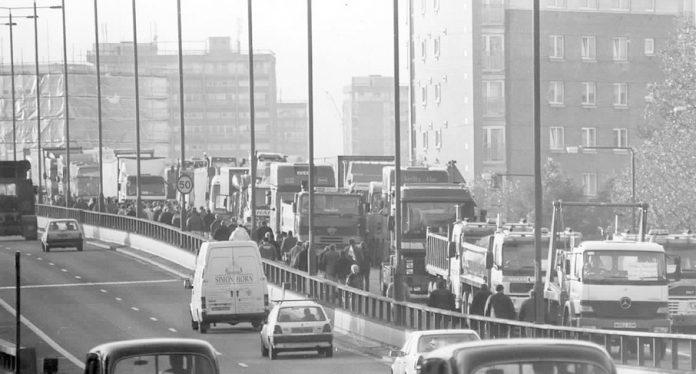
Army drivers are being trained as strikebreakers in the event of a national tanker drivers strike which is expected to be called this week, Cabinet Secretary Maude revealed yesterday.
The result of a Unite ballot of its 2,000 tanker driver members is due to be announced today and in response to an anticipated overwhelming YES vote, strike action ahead of and over the Easter Bank Holiday weekend is widely expected.
Unite says there have been ‘unrelenting attacks’ on drivers’ terms and conditions and the strike could begin as early as April 3rd.
The 2,000 drivers being balloted account for 90 per cent of those supplying petrol to UK forecourts.
Maude said the strikebreaking ‘training’ will begin this week as part of contingency plans being drawn up to ‘avoid major disruption to fuel supplies’.
Responding to the government threats, Unite general secretary Len McCluskey said yesterday: ‘For over a year we’ve been desperately trying to bring about some stability in the sector and urging government ministers to persuade contractors and oil companies to engage in meaningful discussions with us.
‘Unfortunately it’s proving difficult to get them to respond. That leads to frustration as workers feel that no one is listening to them.
‘We’ll need to analyse the turnout and feeling of members before deciding whether to take any industrial action, but we always hope that negotiations can resolve the situation.’
Announcing the ballot last month, Unite stressed that ‘the vote is not about pay but is about establishing a forum to agree industry-wide best practice on safety, training and terms and conditions in order to stabilise a nationally vital industry.
‘The union’s attempts to progress the forum have been thwarted by employers’ unrelenting attacks on drivers’ terms and conditions.
‘Tanker drivers work in an increasingly fragmented, pressurised industry with concerns building that corners are being cut on safety and training in a bid to squeeze profits and win contracts.
‘Drivers face growing job insecurity as a result of the contract merry-go-round and a “beat the clock” culture has flourished with drivers forced to meet ever shorter delivery deadlines.
‘Final salary pension schemes have been swapped for inferior money purchase schemes, and some workers are now on their sixth pension in as many years with 10 to 15 years left to go in the industry.’
Cabinet Office minister Maude said the government has ‘learnt the lessons’ of the fuel blockades of 2000, which brought the country to a standstill and stood ‘ready to act’ in case of a strike.
Maude said: ‘Although we are pushing for an agreement, we have learnt the lessons of the past and stand ready to act to minimise disruption to motorists, to industry and, in particular, to our emergency services, in the event of a strike.’
ATUA National Secretary Dave Wiltshire said: ‘Any attempt at army strikebreaking must be met by the TUC calling a general strike.’